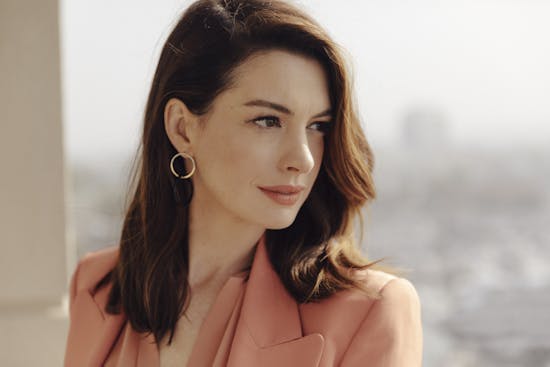Other than being diametrically opposed to the opinion of the guy who wrote her character, you could say Anne Hathaway's first day of work on the thriller "Serenity" went great.
When she greeted writer/director Steven Knight, "the first thing he said to me was, 'She doesn't love Baker Dill.' I couldn't believe the first thing I had to do was disagree with him about somebody he had created, but I believe that she does love him," said Hathaway. "And we found that was the most interesting question: Does she or doesn't she?"
"She" is Karen, whose long blond hair, seductive drawl and interest in having her husband murdered seem to position her as a classic femme fatale. Dill (Matthew McConaughey) is her former lover, a war veteran who works as a fishing guide on an island where Karen arrives with her rich, abusive spouse (Jason Clarke).
Like "Double Indemnity" and "The Postman Always Rings Twice" before it, "Serenity" hinges on the motives of the woman, who may or may not love the chump she hopes will bump off her husband.
"It's so hard to talk about the movie because you and I know the ending, and the twists and turns, but I guess what I would say is that I'm not sure we can ever really know each other," said Hathaway, who was drawn to the role of a woman with little control of her own life.
"Playing Karen made me appreciate that being able to love someone safely is a lot easier to do from a position of privilege, and she doesn't have that privilege. I think a lot of women are not encouraged to stand on their own two feet when they're young. It's not considered necessary if they can find someone great to spend their life with. But if that is taken away from you, you become vulnerable."
In addition to the role, she was attracted to the chance of teaming with McConaughey and with that guy she disagreed with. Knight is the creator of the TV series "Peaky Blinders" and the writer of movies "Allied," "Dirty Pretty Things" and "Eastern Promises," all of which feature the kind of glittering dialogue that actors love to tackle.
"I'm a huge fan of Steven, and I wanted to work with Matthew again as soon as we finished [the 2014 Christopher Nolan film] 'Interstellar.' But I also loved that this is a film about a soldier," she said. "We must respect the heroism of soldiers. We really must. But wars come at such great cost to not just the soldiers but also their families.
Hathaway prepared for the part by speaking with military families and victims of abuse.
When it's suggested to her that Karen plays like a feminist take on the '40s femme fatale — only, unlike those original film noirs, this movie is interested in why the mystery woman behaves the way she does — Hathaway sparks to the notion.
"Someone described Karen to me as a dangerous woman, this very 'femme fatale' kind of description. I think it's interesting that, even without knowing anything about her, people draw those judgments about her because one thing the movie asks is: Where does that desperation come from?" said the Oscar winner for "Les Miserables."
Even the abuse Karen withstands fits the idea of a femme fatale who deserves our empathy, given that a lot of those classic film noir dames ended up with black eyes, which is to say they were victims of abuse long before we had the terminology for it.
"Right? And that was cool back then. It was unquestioned. And the observation about this being my take on a femme fatale: One thing about being an actress at this particular moment, and I use the word 'actress' deliberately, is I get this opportunity to subvert those sorts of stereotypes, to say there's more to this person," she said.
She was referring to a moment Karen gets — one most femme fatales never did — when, as Hathaway phrased it, "The mask drops and you see all the rage and the wrath that comes out."
Which is one thing actor and director agreed on about Hathaway's "Serenity" character: There is a lot more to her than meets the eye.






